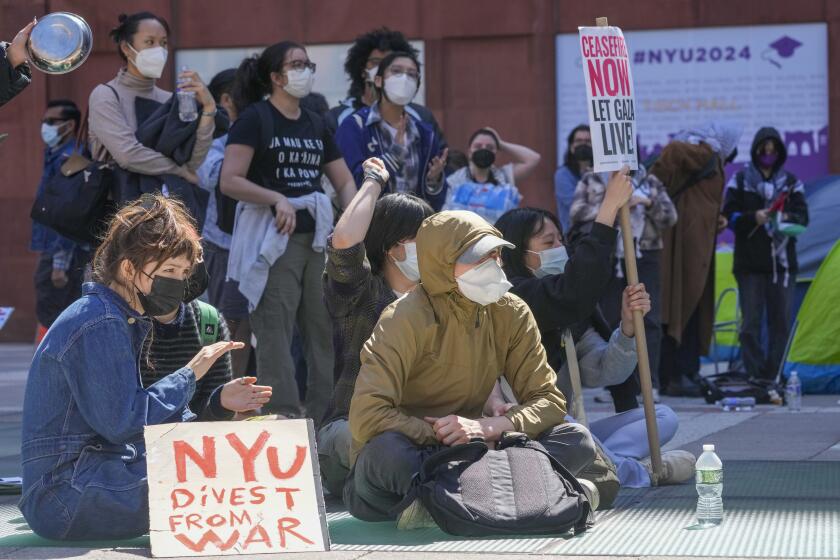Iran sets conditions for nuclear talks
Iran set tough terms Monday for the resumption of nuclear talks, vowing to punish world powers for imposing new sanctions on the Islamic Republic.
President Mahmoud Ahmadinejad said Monday that stalled talks could continue only if the United States, Russia, China and Western Europe included other countries in the discussions, clarified their stance on Israel’s undeclared nuclear weapons arsenal, submitted to the rules of the Nuclear Nonproliferation Treaty and specified whether the talks would be friendly or hostile.
He said that as punishment for new sanctions, Iran would not be prepared to resume talks until late summer.
Ahmadinejad, speaking at a news conference in Tehran, also vowed that Iran would retaliate if there were any attempt to board its ships in search of nuclear components, as demanded by U.S. lawmakers in legislation wending its way through Congress.
“We reserve our right to retaliate against any error on the part of the U.S. Congress,” Ahmadinejad said. “We are capable of defending our rights and we will make them, including Mr. Obama — who arrived with his slogan of change — remorseful of any hostile action against us.”
Iran is at odds with world powers over its continued pursuit of sensitive nuclear technology that the U.S. and its allies allege is aimed at building atomic bombs. Iran insists its program is peaceful and within its rights as a signatory to the Nonproliferation Treaty.
Ahmadinejad was dismissive of concerns raised Sunday by CIA Director Leon E. Panetta that Iran might have the capacity to build a pair of nuclear weapons within two years. “We wonder why the CIA boss is not afraid of the stockpile of 20,000 nuclear weapons, but he fears the possibility of two bombs in Iran,” Ahmadinejad said.
The United Nations, the U.S. and the European Union recently tightened restrictions on trade with Iran in an effort to punish it for refusing to abide by Security Council demands that it halt its continued production of enriched uranium.
Ahmadinejad said Iran remained committed to a possible deal to swap part of its nuclear fuel stockpile for specialized plates to power a Tehran medical reactor as long as Turkey and Brazil, which backed a version of the deal first proposed last year by the United Nations and several major powers, take part in any negotiations.
Still, Ahmadinejad said Iran would continue enriching uranium at levels up to 20% for the medical reactor, which some experts fear is a step closer to producing the highly enriched uranium necessary for a bomb.
“We were not keen on starting the 20% enrichment in the first place,” he said. “However, when we saw that there are some that do not respect basic rights of human beings and are not even prepared to have constructive participation in a humanitarian activity such as producing pharmaceuticals for patients, we had to start the production ourselves.”
More to Read
Start your day right
Sign up for Essential California for news, features and recommendations from the L.A. Times and beyond in your inbox six days a week.
You may occasionally receive promotional content from the Los Angeles Times.






